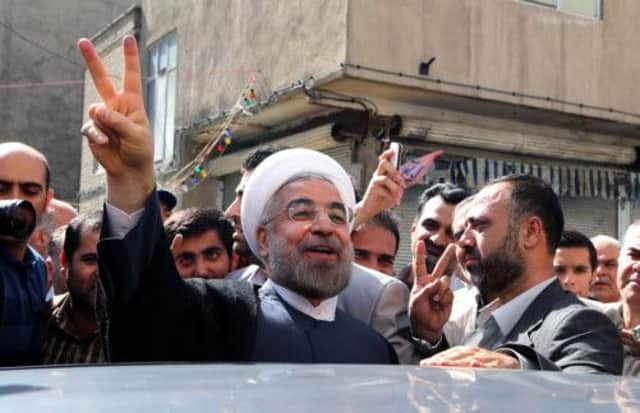Iran: Nuclear breakthrough hopes as moderate wins


Mr Rowhani, 64 – who holds a doctorate of law degree from Glasgow Caledonian University – himself described his success as a victory over “extremism”, while Iran’s reformist press yesterday championed him as the “sheikh of hope”.
A moderate and pragmatic cleric, Mr Rowhani was known for his conciliatory approach when he was Iran’s chief nuclear negotiator a decade ago. During his tenure, Iran suspended uranium enrichment and widened co-operation with international nuclear inspectors.
Advertisement
Hide AdAdvertisement
Hide AdSir Richard Dalton, a former UK ambassador to Tehran, who has met Mr Rowhani on several occasions, described him as a “courteous, effective and extremely well-informed public servant of the Islamic republic”. He has connections “right across Iran’s political spectrum”, added Sir Richard.
“He is someone the West feels it can do business with – if he is permitted to do so,” Sir Richard told The Scotsman. “There is a reasonable chance that on the nuclear issue, he will help formulate a more flexible Iranian position.”
But Sir Richard warned: “I don’t see Iran’s bottom lines on [support for] Syria or Palestine changing.”
At the very least, Mr Rowhani should improve Iran’s international image which took a battering under the hardline outgoing president, Mahmoud Ahmadinejad, over the past eight years as he refused to compromise with the six world powers: the US, Russia, China, France, Germany and the UK on the nuclear issue.
Iran suffers from more than 30 per cent inflation as well as 14 per cent unemployment linked to the sanctions imposed over its suspect nuclear programme.
Mr Rowhani won vital endorsements from two moderate former presidents, Mohammad Khatami and Akbar Hashemi Rafsanjani, who each tried to improve relations with the West and Gulf Arab states.
But sceptics point out that Iran’s hardline supreme leader, Ayatollah Ali Khamenei, still controls nuclear and foreign policy. During the election, he gave stark warning that Iran’s next president should not make concessions to the West.
Yet the unelected ayatollah must into account the views of other power-brokers in Iran, among them the president who acts as its public face.
Advertisement
Hide AdAdvertisement
Hide AdMr Rowhani’s decisive victory – he won 18.6 million of the 37 million votes cast – is a message to the supreme leader that most Iranians reject his policy of “resistance” and confrontation.
The candidate closest to the ayatollah’s views, Saeed Jalili, Iran’s current chief nuclear negotiator, came third in Friday’s election. Mr Rowhani supports Iran’s right to a peaceful nuclear programme and nuclear fuel cycle, but he has argued for a less confrontational approach.
In his first statement after his win was confirmed on Saturday, he called on world powers to treat Iran with respect and recognise its rights. “Then they will hear an appropriate response,” he pledged.
In a recent TV debate Mr Rowhani said: “It is good to have centrifuges running, provided people’s lives and livelihoods are also running.”
It was one of many times during the election campaign that he linked Iran’s worsening economy to the lack of agreement on the nuclear front.
Trita Parsi, of the Iranian National American Council, an advocacy group, said: “If Iran moves in a positive direction, the reaction of the West will be crucial to determine how far that change can go. Any effort by Rowhani to change the relationship with Washington will depend on America’s willingness to tango along.”
SEE ALSO: